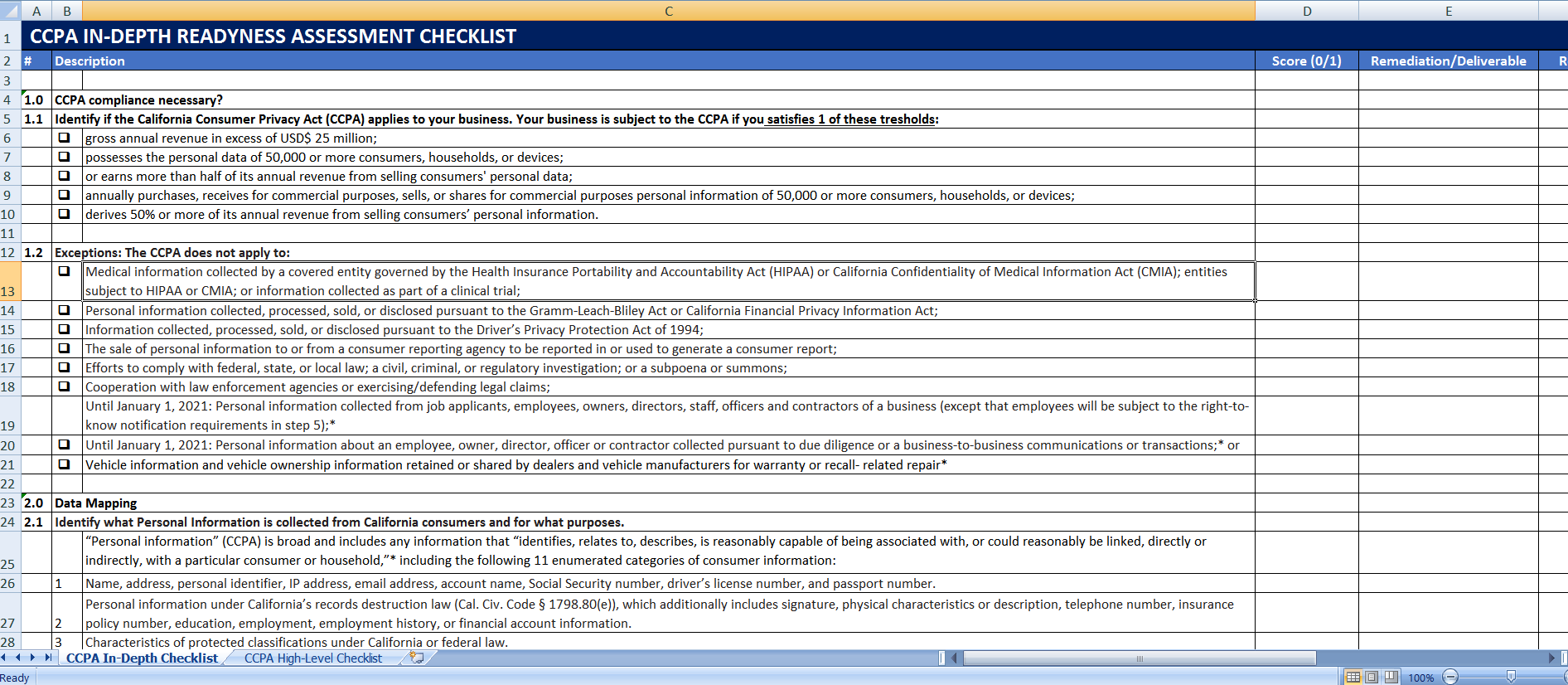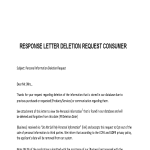CCPA Gap Analysis Readiness

Opslaan, invullen, afdrukken, klaar!
Is your organization already CCPA proof? Are you looking for an effective Gap Analysis tool that provides a format with the measurements needed to comply.
Vandaag: USD 5.99
Download nu!

Beschikbare bestandsformaten:
.xlsx- Gevalideerd door een professional
- 100% aanpasbaar
- Taal: English
- Digitale download (44.3 kB)
- Na betaling ontvangt u direct de download link
- We raden aan dit bestand op uw computer te downloaden.
Wettelijk gegevens Informatie Californië CCPA-vereisten
Is your organization already CCPA proof? Are you looking for an effective Gap Analysis tool that provides a format how to implement the measurements needed to comply?
The California Consumer Privacy Act (CCPA) is a sweeping change to existing privacy laws in the United States and CCPA focuses on transparency obligations and on provisions that limit the selling of personal information. The CCPA will impact many businesses and activities that were previously not yet subject to the privacy regulations in the US. The law is not limited in scope to entities that have physical operations in the state of California. But it applies to entities that are “doing business” in California and collect personal information of consumers.
The intention of the CCPA is an important change in data privacy regulations in the USA, as it aims to give Californian consumers broad rights to access and control their personal information. The bill (AB-375) was passed by the California State Legislature and signed into law by the Governor of California, on June 28, 2018, to amend Part 4 of Division 3 of the California Civil Code.
The CCPA applies to any business, including any for-profit entity that collects consumers' personal data, which does business in California, and satisfies at least one of these thresholds:
- annual gross revenues in excess of $25 million;
- possesses the personal information of 50K or more consumers, households, or devices; or
- earns more than half of its annual revenue from selling consumers' personal data;
- organizations are required to "implement and maintain reasonable security procedures and practices" in protecting consumer info.
Definition Personal Information according to CCPA:
Any information that identifies, relates to, describes, is capable of being associated with, or could reasonably be linked, directly or indirectly, with a particular consumer or household. Unique Examples: the real name, alias, postal address, unique personal identifier, online identifier, internet protocol (IP) address, email address, account name, social security number, driver's license number, passport number, search history, biometric data, geolocation or other similar identifiers.
The intentions of the Act are to provide California residents with the right to:
- access their personal info;
- prevent the sale of personal info;
- know what personal info is being collected about them;
- know whether their personal info is sold or disclosed and to whom;
- request an organization to delete any personal data about a consumer collected from that consumer;
- not be discriminated against for exercising their privacy rights.
Enforcement date: January 1, 2020, at which time those businesses in non-compliance may face civil fines between $2,500 and $7,500. Californian residents have the private right of action for data breaches, in case of failure is proven, there can be statutory damages between $100 and $750.
We're here to help you become compliant. For example, by checking this gap analysis, you will find that it is required to place a link to “Do Not Sell My Personal Information” your company homepage. The CCPA comes with a set of Rules and Regulations for the protection of personal data inside and outside the state of California and affects all businesses that save personal data from California residents.
We provide example CCPA document templates and also a complete set of CCPA templates in order to help you to comply with the new amendment of the California Civil Code. These CCPA document templates are provided in Microsoft Office formats, and easy to customize to your organization’s specific needs. Often completed example documents are also provided in order to help you with your implementation in order to save precious time.
Download this CCPA Gap Analysis Readiness now and find out in 15 steps what work needs to be done to become compliant. Besides, check out our fit-for-purpose CCPA Compliance Toolkit here or a free CCPA Compliance Roadmap! The document(s) will be available to download immediately after purchase.
DISCLAIMER
Hoewel all content met de grootste zorg is gecreërd, kan niets op deze pagina direct worden aangenomen als juridisch advies, noch is er een advocaat-client relatie van toepassing.
Laat een antwoord achter. Als u nog vragen of opmerkingen hebt, kunt u deze hieronder plaatsen.


